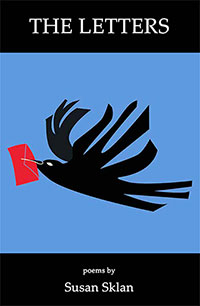 *
*
Review by Off The Shelf Correspondent Lee Varon
It sounds cliché to say of a book that the author’s words leapt off the page. Yet I can’t think of a better expression to describe the feeling I had when reading the poems of Susan Sklan. The letters on which all of these poems are based, are actual letters written by Sklan’s grandmother who lived in the Warsaw Ghetto before her presumed death in the Treblinka concentration camp. Most of the letters Sklan’s grandmother wrote were to her son (Sklan’s father) in England. He escaped Warsaw to England when he was seventeen, a few weeks before war began. After the war he immigrated to Australia, the only one of his immediate family to survive. These lucid and beautiful poems are reflections on the letters of her grandmother, and often contain her grandmother’s own words.
Although Sklan never met her grandmother, she is obviously very much alive to the poet and becomes alive for us through her poetry.

The Letters
by Susan Sklan
Main Street Rag Publishing, 2023
These poems particularly spoke to me since many of my own grandfather’s Ukrainian Jewish family had perished in pogroms and later, the Holocaust. And like Sklan’s father, my grandfather never spoke of the horrors he had witnessed.
Growing up, Sklan writes, “my sister and I understood intuitively that our father had suffered a terrible loss that was too terrible to talk about.”
The poems in The Letters bear witness to this terrible segment in history. My stomach clenched when I read: “At day break there was/ a knock at the door. Did it wake you/ or were you already waiting? /How did you decide what to take/ and what to leave behind?”
Sklan’s language is simple and clear with strikingly powerful images. The descriptions of the worsening conditions in the ghetto are gut wrenching: “Children run faster, faster. / Thin limbs fly over shadows/ suitcases, bundles of bedding, / around swollen corpses.” And later in the same poem: “A man stuffs his thoughts in his hat/ and wedges it firmly on his head.”
The poet, trying to understand what her grandparents’ life was like, decides to google their street and finds: “Even the iconic holocaust photo of a young boy, / holding his hands above his head/ a submachine gun pointing to him, / the boy with eyes open with fear/ was marched along your street. / Did you see him?”
In a poem entitled simply, Then There Were No More Letters, Sklan wonders how her grandmother met her fate: “Did you survive the march to the station/ and be rammed in a train to Treblinka?” And later in this poem this breathtaking line: “You had no choice how you left with your wide awake heart” This single line could be emblematic for all refugees who in the fullness of their lives, are suddenly uprooted, their lives destroyed.
The experience of Sklan’s father was similar to the experience of of other refugees. She writes of him: “a glimmer of hope/ under Sydney sun./ The graffiti scrawled on a Bondi Beach wall, Go Home Reffos/ never let him forget.”
Incredibly, even as Sklan’s grandmother was wasting away in the ghetto, she wrote endlessly hopeful, encouraging, and loving words to her beloved son who she would never see again.
Some of Sklan’s poems are written as letters addressed directly to her departed grandmother as if she could read them beyond the grave. “Dearest Grandmother/ my father took the courage/ you sent him/ and clipped it to his heart.” And later in this poem writing about her father to her departed grandmother: “I want to assure you/ that sometimes happiness found him.”
Sklan speculates what her grandmother might have been like: “What was your hair color?” and “Did you have brothers and sisters? / Who made you laugh? / At the end did you hope, despite the odds/ for more hope?” she asks in a poem entitled, Just Gone.
The poet feels that the letters have given her the gift of her grandmother’s voice and she has now brought us this gift of her poems.
One might assume this book about such a dark time in history would be unremittingly depressing but, in fact, this is a book ultimately about hope, courage and fortitude. Of her grandmother Sklan writes: “You gather your coat of courage/ and wave your flowering spirit.” Her grandmother, Sklan writes: “rose to the light,/ despite the deadly pit/ you were forced in.”
I felt, in these words, the poet challenges us all, despite whatever darkness we may find ourselves in, and despite the sadness engulfing our world, to rise to the light.















Reader Comments